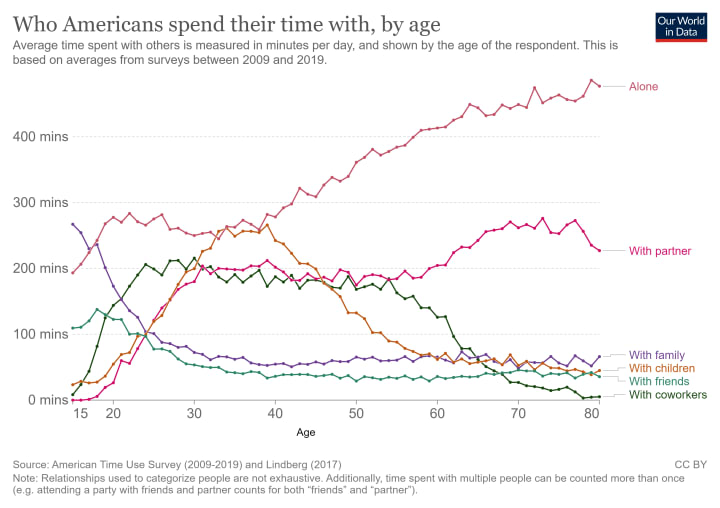Manage the time you spend on relationships as you do your money
Time = the most precious commodity

2022 has been a very tough year as we had a number of deaths in my family. As I shared in my article on Investing's Role in Life, understanding what's important in one's life is something everyone should take the time to think about and reevaluate every few years. Getting clarity on and then frequently reminding oneself about what really matters helps with maintaining focus in one's life. In the vein of further diving into what I've realized this year is very important to me - time spent with family and friends - I'd like to talk today about an aspect of our lives which most people don't actively think about and certainly don't put enough emphasis on: time spent on relationships.
When we were heading home from visiting family over Thanksgiving, I was struck by how quickly three days pass. We had seen my mother and both my siblings with their respective families as well as a cousin who'd recently moved into the area. In addition, my older son whose university is less than 100 miles from where my siblings live, had taken the train to meet us there. It was the first time I'd seen him since dropping him off in September to start his first year at college. It was a fun few days just spending time with each other, talking, having some good food and we also sprinkled in a visit to a temple dedicated to the god who my recently departed father venerated greatly.
On the long, seven-hour drive home, I was thinking about an article I had recently read by Sahil Bloom titled How We Spend our Time, which goes through the various groups of people with whom we have our relationships and how the time spent on those relationships changes through the course of our lives. I'll summarize the key concepts below, but would definitely recommend that you spend 5–10 minutes to read the article to get more detail:
Family: We spend a tremendous amount of time with our parents, siblings and other family in our younger years. Once we hit our 20s though, that time drops precipitously
- Friends: Time spent with friends peaks around 18 and then falls to a low baseline
- Partner: The time spent with your partner increases as you age. They will be the person who you spend the most time with in your older years
- Children: Once you have children, the amount of time you spend with them grows significantly, until they reach their adulthood. At that point, it drops to a very low level
- Coworkers: Throughout your working life, you will spend a great deal of time with your coworkers. As you approach retirement, that time will decrease significantly until it approaches zero late in your life
- Alone: Time spent alone starts at a low level, then grows to a still low plateau as you age. When you reach middle age and your children start leaving home, that number starts growing again and does so through the remainder of your life
In chart form, here's how the combination of time spent with the six different groups outlined above looks like:

The thing that struck me the most about Mr. Bloom's article is that we have the ability to impact the shape of the above curves. As a simple example, by making the effort to more frequently call or visit those members of your family who you are close with, you are able to increase (or at least minimize the level of decrease) the amount of time spent with them as you age.
It takes time and effort to impact these curves though. So, just like I've been writing about taking the time and effort to manage your finances, I would highly recommend being systematic and planning out how you spend your time on relationships. Your time is a precious commodity and, given that there are a fixed amount of hours in the day, any time you devote to one set of relationships has an opportunity cost (= the loss of potential gain from other alternatives when one alternative is chosen; definition from Oxford Languages as quoted by Google) of taking away from time spent on another relationship. So, your planning will have to manage the mix of time across all of your relationships to ensure you get the balance that has the greatest psychological return on that time.
We're all different people, so how you choose to allocate your time will differ based on what's important to you. However, I thought it would be useful to readers to see how I am approaching my time on relationships after all the introspection I've conducted in this very tough year:
- Family: I've always taken my family for granted without making meaningful efforts to spend time with them. Now, as I'm getting older, I realize how much they mean to me. I plan to make more of an effort to reach out and speak more frequently with them
- Friends: I'm prioritizing those friends who Mr. Bloom described as the "Darkest Hour Friends" and will reach out to them more often
- Partner: As our children age and the first of our two sons has left for university, my wife and I are making more of an effort to spend time doing fun things with each other
- Children: Our children are reaching adulthood and focusing more on their own lives. While a lot less frequently in the past, my wife and I are trying to block off time where the four of us can be together doing things that we all like
- Coworkers: I'm fortunate that I can count a number of my coworkers as friends. In the near future, I will continue spending a meaningful amount time with them both as further investment in my career and as part of spending quality time with key friends
- Alone: This one is hard for me. I haven't historically been great with alone time, but am trying to develop interests such as going on bike rides or working out where I can spend time alone in a way that supplements the rest of my life
Thank you again for joining me on my journey to build financial literacy for young adults and their families. If you are interested in reading more of my posts, please access my author page (https://vocal.media/authors/sudhir-sahay) where you can see all the posts I’ve published. If you have any questions on today’s post of if there are any topics you’re interested in my broaching in future posts, please let me know. I can be reached at [email protected].
About the Creator
Sudhir Sahay
Sudhir Sahay is a Sales and Marketing executive and a father of two young men. Sudhir hopes to share his journey building basic financial literacy for his children and providing savings and investing advice to their friends and peers.






Comments
There are no comments for this story
Be the first to respond and start the conversation.